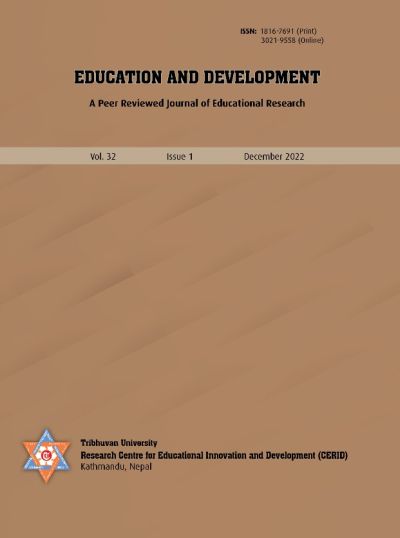Understanding the Attitudes of School Teachers Towards Inclusive Education at the Local Context of Nepal
DOI:
https://doi.org/10.3126/ed.v32i1.61595Keywords:
general education teachers, inclusive education, special needs education, teachers attitudeAbstract
Teachers' positive attitudes are widely acknowledged as necessary for successful policy making and implementation of inclusive education. This study aims to assess general education teachers’ attitude towards inclusion of children with special needs education into regular education classrooms. It seeks to replicate previous findings regarding the effects of gender, age group, educational qualification, years of teaching, teaching levels and the class size in relation to inclusive education in the local context of Nepal. Following descriptive survey design, ninety-five general education teachers from Kirtipur Municipality, Nepal responded. For this study all schools located in that municipality were selected, and the teachers by using a census approach. The "Scale of Teachers’ Attitude Toward Inclusive Classroom (STATIC)" created by Cochran (1999) in Missouri, United States was adapted into Nepali language and used as a data collection tool that has four themes in a 5-point Likert-type scale. The midpoint or point 'three' of the replies was regarded as neutral, while less than that was labeled negative and more than that was considered a positive attitude. The major findings of the study indicate that the overall attitudes of the teacher participants are positive toward inclusive education, however it seems only at a minimal level or slightly positive. There was no significant difference in overall attitudes by teachers’ gender, age group, educational qualification, teaching levels, teaching experience and students class size. The study concludes that more effort is required to enhance the teachers' understanding of inclusive education by various means including in-service training, seminars and exposure as well as promoting a collaborative culture. The internal consistency among items was indicated acceptable level and inter-themes correlation were positive.
Downloads
Downloads
Published
How to Cite
Issue
Section
License
Copyright (c) 2022 The Author(s)

This work is licensed under a Creative Commons Attribution-NonCommercial 4.0 International License.
CC BY-NC 4.0. This license requires that reusers give credit to the creator. It allows reusers to distribute, remix, adapt, and build upon the material in any medium or format, for noncommercial purposes only.




